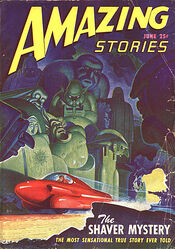Are You Sure (October 8)

Are You Sure ...
• ... that writer and artist Richard Sharpe Shaver (8 October 1907 – 5 November 1975) achieved notoriety with stories in which he claimed that he had personal experience with a sinister, ancient civilization that harbors fantastic technology in caverns under the earth?
• ... that mathematician Joseph Wedderburn (2 February 1882 – 9 October 1948) showed that every semisimple algebra finite-dimensional can be constructed as a direct sum of simple algebras, and that every simple algebra is isomorphic to a matrix algebra for some division ring; and that the Artin–Wedderburn theorem generalizes this result with the ascending chain condition?
• ... that SN 1604, also known as Kepler's Supernova, was a Type Ia supernova that occurred in the Milky Way, in the constellation Ophiuchus; that it appeared in 1604; and that prior to the adoption of the current naming system for supernovae, it was named for Johannes Kepler, the German astronomer who described it in De Stella Nova ("The New Star")?
• ... that theoretical physicist Tullio Regge (11 July 1931 – 23 October 2014) introduced Regge calculus, a simplicial formulation of general relativity; and that Regge calculus was the first discrete gauge theory suitable for numerical simulation, and an early relative of lattice gauge theory?